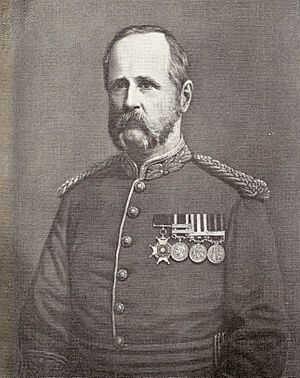James Walker (surveyor general) facts for kids
James Thomas Walker (born December 1, 1826 – died February 16, 1896) was an important Anglo-Indian surveyor. He became the Surveyor General of India, which meant he was in charge of mapping the entire country. He was also a member of the Royal Society, a group for top scientists.
Contents
Early Life and Education
James Walker was born in Cannanore, India. His father, John Walker, worked for the government in Madras. James went to school in Wales and later studied at a military college in England. This college was run by the East India Company, a powerful British trading company.
Military Adventures and Engineering
In 1844, James Walker joined the Bombay Engineers as a young officer. This group was like military engineers.
Early Assignments
- In 1846, he worked as an engineer in Sindh, India.
- He helped in the Second Anglo-Sikh War in 1848. He was in charge of a group of sappers (soldiers who build or destroy things) at the battle of Gujrat.
- After the war, he helped map the northern-west border of India from 1849 to 1853.
- He was praised for his skill in building a bridge over the fast-flowing Kabul River.
- He also helped build a bridge over the swift Swat River in 1852.
Indian Mutiny and Injury
In 1857, the Indian Mutiny began. Walker went to Delhi and became a field-engineer.
- He was ordered to blow up a gate of a building where enemies were hiding. He did this by firing a musket into gunpowder, which exploded the gate.
- This allowed his soldiers to attack and defeat the enemy.
- During this action, Walker was badly wounded in his left leg by a bullet.
- While he was getting better, he also got very sick with cholera.
- He was promoted to captain in 1857.
Later Military Work
After recovering, he continued his survey work. In 1860, he joined another military expedition. He was present at the attack of Barara Tanai.
The Great Trigonometrical Survey
In 1861, James Walker became the superintendent of the Great Trigonometrical Survey of India. This was a huge project to accurately map the entire Indian subcontinent using triangles and measurements.
Mapping India's Vast Lands
- He finished the last three "meridional series" (lines of measurement running north-south) in northern India.
- His first big independent job was measuring the Vizagapatam base-line in 1862.
- The measurements were incredibly accurate. The difference between his measured length and a length calculated from triangles 480 miles away was only half an inch!
- He also checked and re-measured older surveys in southern India.
- He was promoted to lieutenant-colonel in 1864.
Leading the Survey
- In 1877, he was honored with the title of Companion of the Bath.
- On January 1, 1878, he became the Surveyor General of India. He continued to lead the Great Trigonometrical Survey.
- He was promoted to major-general in 1878 and lieutenant-general in 1881.
- He retired in 1883 and received the honorary rank of general in 1884.
Awards and Recognition
James Walker received many honors for his important work:
- He became a member of the Royal Geographical Society in 1859.
- He was elected a fellow of the Royal Society in 1865. This is a very high honor for scientists.
- He also became a member of the Russian Geographical Society in 1868 and the French in 1887.
- In June 1883, Cambridge University gave him an honorary degree.
His Writings and Contributions
James Walker was also a writer.
- In 1895, he helped with a big geography meeting in London.
- He wrote an important paper called "India's Contribution to Geodesy" (the science of measuring the Earth).
- He also wrote articles for the Encyclopædia Britannica about topics like the Oxus River and surveying.
- His articles also appeared in other scientific journals.
Personal Life
James Walker married Alicia Scott in India on April 27, 1854. They had four children together.
He passed away at his home in London on February 16, 1896. He was buried in Brompton Cemetery.
 | Audre Lorde |
 | John Berry Meachum |
 | Ferdinand Lee Barnett |


